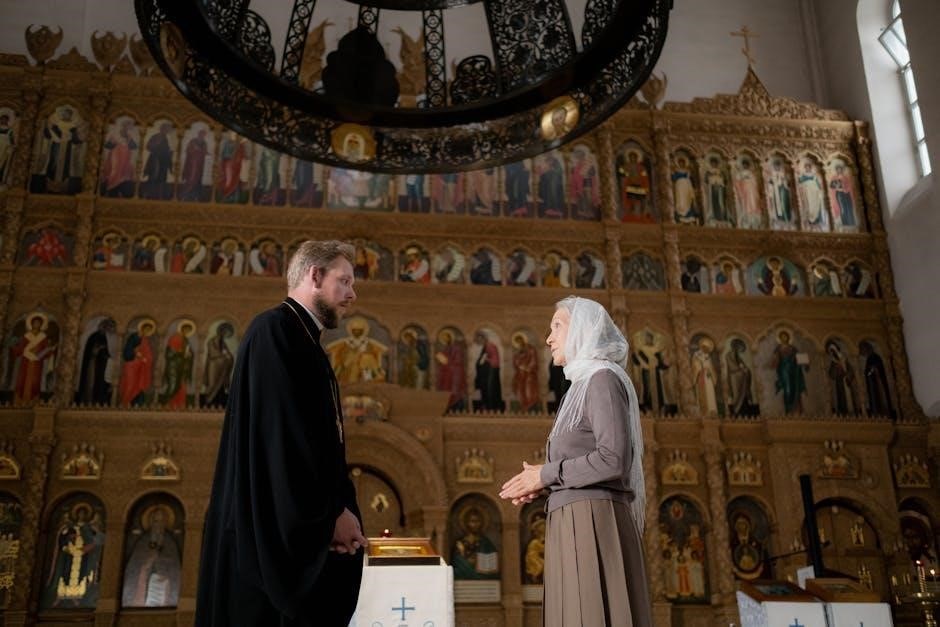Orthodox Confession is a sacred sacrament where believers seek forgiveness for their sins, reconciling with God and the Church through a contrite heart and sincere intent.
1.1. What is Orthodox Confession?
Orthodox Confession is a sacred sacrament in which believers openly acknowledge their sins before a ordained priest, expressing genuine remorse and seeking divine forgiveness. This sacrament involves the confession of sins, both in thought and deed, as a means of spiritual cleansing and reconciliation with God. The priest, acting as a spiritual guide, offers guidance, absolution, and prayers for healing. Orthodox Confession emphasizes the importance of humility and sincerity, fostering a deeper connection with God and the Church. It is not merely a ritual but a profound encounter with divine mercy, enabling believers to live a life transformed by repentance and grace.
1.2. The Significance of Confession in Orthodox Christianity
Confession holds profound significance in Orthodox Christianity as a vital means of spiritual renewal and reconciliation with God. It is a cornerstone of the Church’s teachings, enabling believers to acknowledge their sins, seek forgiveness, and restore their relationship with the Divine. Through confession, individuals are liberated from the burden of guilt, allowing them to grow in holiness and deepen their faith. This sacrament also strengthens the unity of the Church, as it fosters a sense of communal repentance and shared spiritual journey. Ultimately, confession is a powerful expression of God’s boundless mercy and love, guiding believers toward eternal salvation and union with Christ.
1.3. Brief History of Confession in the Orthodox Church
The sacrament of confession in the Orthodox Church traces its roots to the early Christian Church, where public confession was a common practice. Over time, private confession emerged as a more personal and intimate way of seeking forgiveness. The Orthodox Church formalized this practice, emphasizing the role of the priest as a spiritual guide and witness to the confession. Throughout centuries, confession has remained a vital part of Orthodox spirituality, reflecting the Church’s commitment to spiritual healing and reconciliation with God. This sacrament has evolved in practice but retains its core purpose: to restore the believer’s relationship with the Divine and the Church.

Preparing for Confession
Preparing for confession involves introspection, prayer, and self-reflection to acknowledge sins and seek forgiveness. It requires a humble heart and readiness to confront spiritual shortcomings honestly.
2.1. Spiritual Preparation: Prayer and Self-Reflection
Spiritual preparation for confession begins with heartfelt prayer, seeking God’s guidance and grace. Engage in self-reflection, examining thoughts, words, and actions to identify sins and weaknesses. Use prayer books or Psalms to deepen repentance. Consider fasting to cleanse the body and soul, creating a conducive environment for introspection. Recall past mistakes, not to dwell on guilt, but to learn and grow. Humbly acknowledge your dependence on God’s mercy, fostering a sincere desire to change. This inward journey readies the heart to approach confession with honesty and contrition, essential for a meaningful sacrament.
2.2. Practical Preparation: Fasting and Readiness
Practical preparation for confession involves fasting, a traditional Orthodox practice to purify the body and soul. This fasting is not just physical but also mental, helping to focus on repentance. Typically, one fasts from midnight before confession, avoiding food and drink. Additionally, arrive early at the church to collect your thoughts and organize what you wish to confess. Bring a list of sins if it helps, ensuring clarity and honesty. Dress modestly and approach the sacrament with reverence. These practical steps create a conducive environment for a sincere and meaningful confession, fostering a deeper connection with God.
2.3. Gathering Your Thoughts: What to Confess
Gathering your thoughts before confession involves reflecting on your actions, words, and thoughts to identify sins and weaknesses. Consider how you have fallen short of God’s commandments and the values of Christianity. Be specific about instances where you caused harm, acted selfishly, or neglected spiritual growth. Include sins of omission, such as missed opportunities to show love or kindness. Avoid vague generalizations; instead, focus on concrete examples. Reflect on your motivations and the impact of your actions on others. This preparation helps ensure honesty and sincerity, making the confession meaningful and effective in seeking forgiveness and spiritual healing.
2.4. The Role of a Spiritual Father
A spiritual father plays a vital role in Orthodox Confession, serving as a guide, mentor, and intermediary between the penitent and God. He offers wisdom, encouragement, and correction, helping the believer recognize and repent of sins. The spiritual father provides spiritual direction, ensuring the confession is thorough and meaningful. His role is not judgmental but paternal, offering comfort and reassurance. He may also assign penance to aid spiritual growth. The spiritual father’s experience and understanding of Orthodox teachings help the faithful navigate their struggles and deepen their relationship with Christ. His guidance fosters accountability and supports the journey toward holiness and humility;

The Process of Confession
Orthodox Confession involves a solemn, prayerful dialogue with God, guided by a priest, where sins are acknowledged, repentance is expressed, and divine forgiveness is sought humbly.
3.1. Entering the Church and Approaching the Confessional
Entering the church with a prayerful and reverent heart is the first step. Upon approaching the confessional, one should make the sign of the cross, bow, or kiss the cross as a sign of humility. The confessional area is a sacred space, and the believer should approach it with respect, ready to open their heart before God and the priest. The priest, representing Christ, is prepared to guide the penitent through the sacrament. The atmosphere is one of confidentiality and spiritual support, fostering an environment where one can freely confess their sins with sincerity and trust in God’s mercy.
3.2. The Ritual of Confession: A Step-by-Step Guide

Upon entering the confessional, the penitent makes the sign of the cross, bows, or kisses the cross as a gesture of humility. The priest greets them with a prayer or blessing, setting a spiritual tone. The penitent begins by stating their intention to confess, often with a brief prayer asking for forgiveness; They then list their sins openly and honestly, avoiding excuses or justifications. The priest listens attentively, offering guidance or words of comfort. After the confession, the priest provides penance and pronounces absolution, reinforcing God’s forgiveness. The penitent responds with gratitude, often through prayer or a bow, before departing with a renewed sense of peace and commitment to change.
3.3. The Priest’s Role in Confession
The priest in Orthodox Confession acts as a spiritual father, guiding the penitent toward repentance and healing. They listen attentively to the confession, offering words of comfort and advice. The priest does not judge but serves as a vessel of God’s mercy, ensuring confidentiality. They provide spiritual direction, helping the penitent understand their sins and how to amend their ways. The priest also prays for the penitent and imparts absolution, reinforcing God’s forgiveness. Their role is both pastoral and sacramental, fostering spiritual growth and reconciliation with God and the Church.
3.4. Receiving Absolution and Penance
After confessing their sins, the penitent receives absolution, a divine forgiveness imparted by the priest. The priest prays for the penitent, asking God to forgive their transgressions. This act of absolution is a sacramental expression of God’s mercy and restores the believer’s communion with the Church. Along with absolution, the priest may assign penance, such as specific prayers, fasting, or acts of charity, to aid the penitent in their spiritual growth. Penance serves as a means of healing and reconciliation, helping the individual avoid repeating the same sins. The combination of absolution and penance underscores the Orthodox Church’s emphasis on both forgiveness and spiritual transformation.

After Confession
After confession, the focus shifts to gratitude and spiritual renewal. The believer engages in prayer and reflection, seeking to deepen their relationship with God and avoid future sins.
4.1. Thanksgiving and Prayer After Confession
Thanksgiving and prayer after confession are essential for expressing gratitude and deepening spiritual renewal. Believers often recite prayers like the “Prayer of Thanksgiving,” emphasizing humility and the grace of forgiveness. This practice helps cultivate a heart of praise and acknowledges God’s mercy. Prayer after confession strengthens the believer’s connection to God, fostering a sense of peace and resolve to avoid sin. It is a moment to reflect on the gift of forgiveness and renew one’s commitment to living a virtuous life. Through prayer, the Orthodox faithful seek to integrate the grace of confession into their daily lives, growing closer to Christ.
4.2. Reflecting on the Experience
Reflecting on the confession experience is a vital step in the journey of repentance. It involves introspection, analyzing the emotions and thoughts felt during and after the sacrament. This reflection helps deepen the understanding of one’s spiritual state and the seriousness of sin. It also fosters gratitude for God’s forgiveness and the Church’s role in the healing process. By contemplating the experience, believers can identify patterns of sin and areas for improvement. This introspection guides them toward meaningful change and spiritual growth. Regular reflection strengthens resolve to avoid future transgressions, fostering a deeper connection with God and a commitment to living a life of repentance and virtue.
4.3. Avoiding the Same Sins: A Path to Spiritual Growth
Avoiding the same sins requires a commitment to spiritual growth and self-awareness. After confession, believers must identify the root causes of their sins and actively work to eliminate them. This involves prayer, fasting, and engaging in virtues that counteract past weaknesses. Seeking guidance from a spiritual father and immersing oneself in spiritual practices, such as regular prayer and reading of Scripture, can provide the necessary tools to resist temptation. By cultivating humility and self-control, individuals can gradually overcome sinful habits. This process not only strengthens their relationship with God but also fosters a life of continuous repentance and spiritual renewal.
Common Challenges in Confession
Many struggle with fear, embarrassment, and self-justification, hindering genuine repentance. Overcoming these challenges requires humility, trust in God’s mercy, and a sincere desire for spiritual transformation.
5.1. Overcoming Fear and Embarrassment
Confession often evokes fear and embarrassment due to human pride and the discomfort of exposing sins. Many worry about being judged by the priest or others. However, Orthodox theology emphasizes that the priest acts as a spiritual father, not a judge, and that confession is a healing encounter with Christ. To overcome these feelings, one must remember that God already knows our sins and desires our repentance. Prayer for humility, self-reflection on the gravity of sin, and focusing on God’s infinite mercy can help diminish fear. Embarrassment fades when one realizes the liberation found in sincerity and the pursuit of spiritual healing.
5.2. Dealing with Doubts and Guilt
Doubts and feelings of guilt often accompany the sacrament of confession, as individuals grapple with the weight of their sins. It’s natural to question whether one’s repentance is sincere or whether certain sins are too great to be forgiven. Orthodox teaching reminds us that such doubts are not obstacles but opportunities for growth, as they reveal the depth of our fallenness. Guilt, when properly acknowledged, can lead to genuine contrition and a deeper reliance on God’s mercy. Seeking guidance from a spiritual father and focusing on the boundless love of Christ can alleviate these struggles. Remember, confession is not about self-justification but about humility and trust in God’s forgiveness.
5.3. The Struggle to Be Honest
Honesty in confession can be a significant challenge, as many struggle to fully disclose their sins due to fear, shame, or self-justification. Recognizing this difficulty, Orthodox teachings emphasize that true repentance begins with sincerity. Withholding sins, even out of embarrassment, hinders the healing process and the grace of forgiveness. It’s important to remember that the priest acts as a witness to the confession, not as a judge, and that Christ’s mercy is boundless. Overcoming this struggle requires prayer, self-awareness, and trust in the sacrament. By embracing vulnerability and striving for openness, one can experience the liberating power of confession and deepen their relationship with God.

The Benefits of Regular Confession
Regular confession offers spiritual healing, clarity of conscience, and renewed grace, fostering a deeper connection with God and a life of righteousness.
6.1. Spiritual Growth and Renewal
Regular confession fosters profound spiritual growth by enabling believers to confront and repent of their sins, thereby deepening their relationship with God. Through this sacrament, individuals are empowered to overcome sinful patterns, embracing a life of virtue and humility. The process of self-reflection and confession cultivates a heightened awareness of one’s spiritual state, encouraging a continuous journey toward holiness. Confession also strengthens the believer’s resolve to follow Christ, as they experience the transformative power of divine grace. Ultimately, regular confession becomes a cornerstone of spiritual renewal, guiding believers toward a more authentic and Christ-centered life.
6.2. Emotional and Psychological Healing
Orthodox confession offers profound emotional and psychological healing by allowing believers to unburden their consciences and find peace through forgiveness. The sacrament provides a safe space to confront inner turmoil, guilt, and shame, fostering emotional liberation. By confessing sins, individuals release the weight of their transgressions, experiencing a renewal of spirit and mind. The priest, acting as a spiritual healer, offers guidance and comfort, helping to address deep-seated struggles. This process not only restores emotional balance but also strengthens one’s mental resilience, enabling them to face life’s challenges with renewed hope and clarity. Through confession, the soul is healed, and the heart is lightened.
6.3. Strengthening Communion with the Church
Orthodox confession deepens one’s connection to the Church, reinforcing the understanding that salvation is a communal journey. By confessing sins, believers acknowledge their unity with the Body of Christ and seek healing not only for themselves but for the entire community. This sacrament fosters humility and mutual support among the faithful, reminding them that spiritual struggles and triumphs are shared experiences. Regular confession strengthens the bond between individuals and the Church, enabling believers to participate more fully in the life of the community. It also prepares them to receive the Eucharist with a pure heart, further uniting them with Christ and His people.

Practical Tips for a Meaningful Confession
Approach confession with preparation, sincerity, and an open heart. Use prayer, self-reflection, and honesty to deepen your experience. Seek guidance from your spiritual father and embrace the process humbly.
7.1. How Often Should You Confess?
The frequency of confession varies depending on personal spiritual needs and circumstances. The Orthodox Church recommends confessing at least once a month, especially before receiving Holy Communion. However, this can differ based on individual struggles, such as frequent sin or life challenges. Some may need to confess more often, while others, after achieving a stable spiritual state, might confess less frequently but still regularly. Ultimately, the guidance of a spiritual father is crucial in determining the appropriate frequency for each person. Regular confession helps maintain spiritual health and fosters a deeper relationship with God.
7.2. The Importance of Preparation
Proper preparation is essential for a meaningful confession. It ensures that the sacrament is approached with sincerity and clarity. Preparation involves prayer, self-reflection, and examining one’s actions and thoughts. Through prayer, believers seek guidance and openness of heart. Self-reflection helps identify sins and weaknesses, fostering genuine repentance. Additionally, organizing thoughts before confession avoids confusion and ensures honesty. Preparation also includes fasting, as prescribed by the Church, to cultivate humility and detachment from worldly distractions. By preparing diligently, one demonstrates respect for the sacrament and a willingness to confront their spiritual shortcomings. This readiness deepens the confession’s effectiveness and fosters spiritual renewal.
7.3. Being Specific in Your Confession
Being specific in confession is crucial for meaningful repentance. Vague statements like “I have sinned” do not allow for genuine healing or spiritual growth. Instead, clearly articulate specific actions, thoughts, or omissions that have caused harm or separated you from God. For example, rather than saying “I was angry,” specify the situation, how you responded, and its impact. This clarity helps you confront your sins honestly and take responsibility for them. It also enables the priest to offer tailored guidance and penance. Specificity fosters accountability and deeper self-awareness, ensuring that the sacrament becomes a powerful tool for transformation. It is an act of humility and trust in God’s mercy.
7.4. Following Through on Penance
Following through on penance is a vital step in the confession process, demonstrating commitment to spiritual growth. Penance, prescribed by the priest, may include prayer, fasting, or acts of charity, serving as a means of making amends and healing. It is essential to approach penance with sincerity, understanding it as a tool for transformation rather than a mere obligation. By fulfilling penance, believers express their resolve to change and avoid repeating the same sins. This act of obedience strengthens the soul and deepens one’s relationship with God, fostering a life of repentance and renewal. Consistency in completing penance is key to its effectiveness.

The Theological Underpinnings of Confession
Orthodox Confession is rooted in the belief that sin separates humanity from God, and Christ’s redemption offers forgiveness. It is a sacrament of reconciliation, reflecting the Church’s role in forgiving sins through the priesthood, as granted by Christ (John 20:23). Confession emphasizes the transformative power of repentance and the healing of the soul, aligning with the Orthodox understanding of salvation as a process of becoming like God (theosis). The sacrament underscores the communal nature of sin and forgiveness, highlighting the Church as a hospital for spiritual healing.
8.1. The Orthodox Understanding of Sin
In Orthodox theology, sin is understood as a separation from God, rooted in humanity’s free will turning away from His divine will. It is not merely a legal transgression but a spiritual sickness that disrupts communion with God and others. Sin is seen as a distortion of the image of God within us, leading to spiritual death. The Church teaches that sin has both personal and communal dimensions, affecting individuals and the entire Body of Christ. Ancestral sin, inherited from Adam, refers to humanity’s fallen state rather than guilt. Through Christ’s redemption, believers are called to repentance and healing, restoring their union with God.
8.2. The Sacrament of Confession: A Divine Gift
The Sacrament of Confession is a divine gift from God, offering believers forgiveness and healing through repentance. Rooted in Christ’s command to forgive sins, it is administered by the priesthood as a means of reconciliation. Through this sacrament, the Holy Spirit works to cleanse the soul, restoring it to a state of grace. Confession is not a human invention but a mysterious encounter where God’s mercy is poured out. It is a profound expression of God’s love, enabling believers to overcome sin and grow in holiness. By participating in this sacrament, the faithful experience spiritual renewal and a deeper union with Christ and His Church.
8.3. The Role of Repentance in Salvation
Repentance is a cornerstone of Orthodox Christianity, essential for salvation. It involves a profound change of heart, a turning away from sin, and a return to God. Through repentance, believers acknowledge their fallenness, express sorrow for their sins, and commit to a life of virtue. This transformative process is not merely emotional but a continuous spiritual struggle. Repentance opens the heart to God’s grace, enabling the forgiveness of sins and spiritual renewal. It is through repentance that individuals can experience theosis, or union with God, which is the ultimate goal of salvation. Thus, repentance is not just a moral duty but a divine gift that leads to eternal life and communion with God.
Orthodox Confession is a powerful sacrament offering forgiveness and spiritual renewal. Embrace it humbly, seeking reconciliation with God and growth in holiness, guiding you toward eternal salvation.
9.1. Encouragement to Embrace Confession
Embracing Orthodox Confession is a profound step toward spiritual healing and renewal. It offers a sacred opportunity to release the burden of sin and draw closer to God’s grace. Confession is not a judgment but a loving encounter with Christ, who desires our repentance and restoration. By humbly acknowledging our weaknesses, we open ourselves to divine mercy and transformation. Regular confession fosters humility, accountability, and a deeper connection to the Church. Let us approach it with courage and faith, trusting in its power to renew our hearts and guide us toward a life of holiness and eternal salvation.
9.2. Final Thoughts on the Journey of Repentance
The journey of repentance is a lifelong path of humility, grace, and transformation. Orthodox Confession offers a powerful means to confront our sins and seek divine forgiveness, but it is only the beginning. True repentance requires perseverance, self-awareness, and a commitment to spiritual growth. Embrace the process with patience, knowing that setbacks are opportunities for deeper humility and reliance on God’s mercy. The goal of repentance is not perfection but a continuous movement toward union with Christ. As you walk this path, remember that every step, no matter how small, brings you closer to the light of His love and the promise of eternal life.
